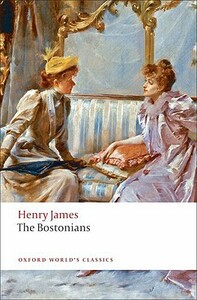Take a photo of a barcode or cover
A fascinating novel from James, as he was known for his tales of American characters traveling through the wilds and society of England and Europe. The Bostonians is his American tale, set between Boston and New York, which illustrates the curiosities to be found on American shores. The main curiosity is the suffragette, and initially, I was excited to be following a depiction of the movement so early in their campaign (in the USA). However, the main male character, Basil Ransom, was a traditionalist that believed that women had their place and should not strive for more than what they were given - and disappointingly he falls in love with a promising orator for women's suffrage, Verena Tarrant.
It becomes a tug-of-war of power and exerting control over the young orator between Basil and his wealthy cousin, Olive. Basil prevails due to the long-established patriarchal views, so submitting to his control was more expected. I was severely disappointed how James tore down the suffrage movement to attempt an illustration of women's inability to commit to a cause.
It becomes a tug-of-war of power and exerting control over the young orator between Basil and his wealthy cousin, Olive. Basil prevails due to the long-established patriarchal views, so submitting to his control was more expected. I was severely disappointed how James tore down the suffrage movement to attempt an illustration of women's inability to commit to a cause.
Difficult read for me. The run-on-sentences were a bit too much. The end was uneventful.
I just seriously wanted Basil Ransom to spontaneously catch on fire and fall in a dark abyss. Seriously, one of the most diabolical characters in fiction I've read this year, and I've read Silence of the Lambs and Richard II. Oh, AND I also re-read Death Note. Though not *quite* Light Yagami levels, I'd say Basil is pretty close, right down to charming women to get what he wants.
I was originally contemplating giving this four stars, because I liked the dialogue so well, but the plot really just plodded along. And I have a higher tolerance for old, long, descriptive writing than most. I did enjoy some of the narrator's snide comments at Basil's expense, though. Those were good for the occasional laugh. Speaking of which, do not play "The Bostonians" drinking game (copyrighted by moi) involving how many times Basil fake laughs.
I should mention the other two prominent characters, Olive Chancellor and Verena Tarrant. I found Olive to be the epitome of a shrinking violet, yet I couldn't help but feel sorry for her. She had very strong views, but at least she wasn't too much of a hypocrite and continued to fight what she stood for. Even with her over-the-top misandry thrown in, though not as deep as Basil Ransom's MRA Red Pill misogyny. At least Olive fought for a movement that dealt with genuinely oppressed, displaced people, even if she didn't go about it in the best way.
Verena...I hated her at first, liked her for a bit when she turned the charm up to 11 to get converts, and finally got ambivalent when, from my perspective, things didn't work out so great for her. Granted, I will say she got manipulated into what ultimately happened to her, but part of it was due to her choices, too.
These characters were basically very flawed and messy, and the book was enjoyable for that. Although my hatred for Basil knows no bounds. Lord Voldemort, who?
I was originally contemplating giving this four stars, because I liked the dialogue so well, but the plot really just plodded along. And I have a higher tolerance for old, long, descriptive writing than most. I did enjoy some of the narrator's snide comments at Basil's expense, though. Those were good for the occasional laugh. Speaking of which, do not play "The Bostonians" drinking game (copyrighted by moi) involving how many times Basil fake laughs.
I should mention the other two prominent characters, Olive Chancellor and Verena Tarrant. I found Olive to be the epitome of a shrinking violet, yet I couldn't help but feel sorry for her. She had very strong views, but at least she wasn't too much of a hypocrite and continued to fight what she stood for. Even with her over-the-top misandry thrown in, though not as deep as Basil Ransom's MRA Red Pill misogyny. At least Olive fought for a movement that dealt with genuinely oppressed, displaced people, even if she didn't go about it in the best way.
Verena...I hated her at first, liked her for a bit when she turned the charm up to 11 to get converts, and finally got ambivalent when, from my perspective, things didn't work out so great for her. Granted, I will say she got manipulated into what ultimately happened to her, but part of it was due to her choices, too.
These characters were basically very flawed and messy, and the book was enjoyable for that. Although my hatred for Basil knows no bounds. Lord Voldemort, who?
I enjoyed this, and appreciate it for addressing the suffrage movement and the presence of independent women living in the late 19th century, where every other novel about upper-half society doesn't seem to ever mention them.
And oh my gosh what an ending! Not expecting such a harrowing finish from Henry James. I was literally laughing in astonishment. It would be a hell of a bookclub-book.
And oh my gosh what an ending! Not expecting such a harrowing finish from Henry James. I was literally laughing in astonishment. It would be a hell of a bookclub-book.
Don't remember having read any Henry James and this is one of the freebies I got when the Nook first came out. During the summer that year, they offered like 5 classics a week for several weeks. I got them all!
The Bostonians is not a happy book, but it is rather interesting. According to the introduction, it is supposed to be a book about friendship between two women. But, as it later points out, the situation is more of a love triangle - or battle of possession. The novel is set just after the civil war. Olive Chancellor lives in Boston and has lost her two brothers to the war. A distant cousin Basil Ransom is from Mississippi and fought for the South. He has come to New York to practice law because there is nothing left for him in Mississippi. His mother and sisters continue there in "genteel penury", but he has come to try to make his "fortune". Olive's mother had invited him to come whenever he was in the North and Olive had also written him a note after her mother passed away to confirm the invitation. So, Basil arrives in Boston on business and goes by to see Olive, meeting her widowed sister Mrs Luna (very frivolous). Olive asks him to stay to dine, then informs him she is going to a meeting at Miss Birdseye's, who has devoted her life to causes, and invites him to go with her. At the meeting, they meet Verena Tarrant. Verena gives a speech after her father has "waked up a spirit" about the rights of women. She is charming and utterly unself-conscious. Both Olive and Basil are charmed by her. Olive takes her under her wing - distancing her from her charlatan father and helpless mother - and educates her about women's rights and the feminist cause so she may speak more intelligently. Basil, however, falls in love with her and wants to remove her from the stage and keep her for himself. He has a prejudice against the new ways and would love for things to be the way they were. He feels this new age is becoming overly feminine. [I suppose it is the beginning of the debate of this time]
The very last sentence of the book is rather haunting. "It is to be feared that with the union, so far from brilliant, into which she was about to enter, these were not the last (tears) she was destined to shed." Which would probably be a correct ending to either position she chose.
The Bostonians is not a happy book, but it is rather interesting. According to the introduction, it is supposed to be a book about friendship between two women. But, as it later points out, the situation is more of a love triangle - or battle of possession. The novel is set just after the civil war. Olive Chancellor lives in Boston and has lost her two brothers to the war. A distant cousin Basil Ransom is from Mississippi and fought for the South. He has come to New York to practice law because there is nothing left for him in Mississippi. His mother and sisters continue there in "genteel penury", but he has come to try to make his "fortune". Olive's mother had invited him to come whenever he was in the North and Olive had also written him a note after her mother passed away to confirm the invitation. So, Basil arrives in Boston on business and goes by to see Olive, meeting her widowed sister Mrs Luna (very frivolous). Olive asks him to stay to dine, then informs him she is going to a meeting at Miss Birdseye's, who has devoted her life to causes, and invites him to go with her. At the meeting, they meet Verena Tarrant. Verena gives a speech after her father has "waked up a spirit" about the rights of women. She is charming and utterly unself-conscious. Both Olive and Basil are charmed by her. Olive takes her under her wing - distancing her from her charlatan father and helpless mother - and educates her about women's rights and the feminist cause so she may speak more intelligently. Basil, however, falls in love with her and wants to remove her from the stage and keep her for himself. He has a prejudice against the new ways and would love for things to be the way they were. He feels this new age is becoming overly feminine. [I suppose it is the beginning of the debate of this time]
The very last sentence of the book is rather haunting. "It is to be feared that with the union, so far from brilliant, into which she was about to enter, these were not the last (tears) she was destined to shed." Which would probably be a correct ending to either position she chose.
I had to read this for class and, honestly, did not expect to like it. It's one of James' most dense and least well-received novels. It's brimming with satire and allegory and things not talked about it. It's about North vs. South, which takes the form of staunchly liberal versus scarily conservative. This makes it especially interesting to read at the moment: it discusses the battle for public opinion and fanaticism. James seems particularly detached from this novel - there isn't a single consistently likable character - and he constantly forces the reader to reevaluate their opinions. He also asked questions about separating person and beliefs i.e. can you like a person without liking their beliefs? It's a hard novel to read. But if you can get into it, it's amazing.
This is such a weird and interesting follow-up to Portrait. I loved Olive Chancellor by the end and found Basil Ransom to be all too familiar. The ending is utterly devastating!
challenging
emotional
reflective
tense
medium-paced
Plot or Character Driven:
Character
Strong character development:
Yes
Loveable characters:
Complicated
Diverse cast of characters:
No
Flaws of characters a main focus:
Yes


